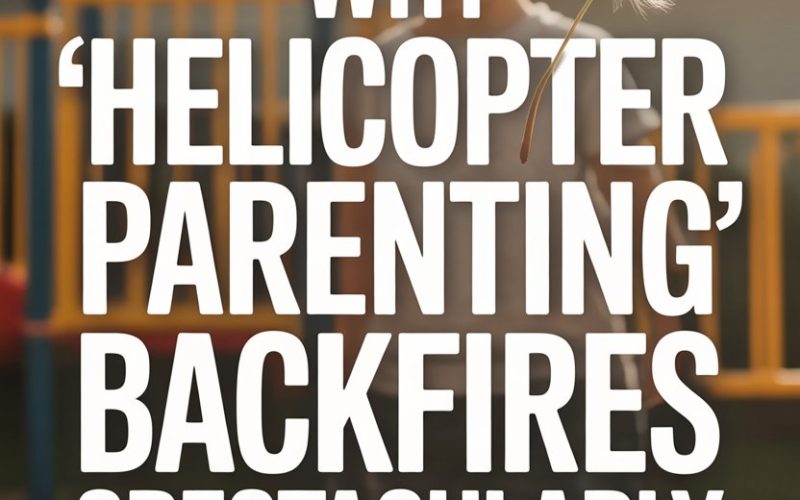Peek into any playground or school gate and you’ll spot them: parents hovering close, ready to swoop in at the first sign of distress, a stumble, or a maths problem gone rogue.
We all want our kids to thrive—but does micromanaging every scraped knee and spelling bee prep actually help? Spoiler: not so much.
Here’s the not-so-secret truth about why helicopter parenting can come back to bite you, and what you can do (tonight!) to set your kids—and yourself—free.
What Helicopter Parenting Really Looks Like
Ever found yourself shadowing your child at a birthday party, napkin in hand, just in case the cake frosting goes rogue?
Or perhaps you’ve orchestrated a “friendly” chat with a teacher because your child’s science project didn’t win a medal?
It’s easy to spot helicopter parenting in others, but a little tougher to see when we’re the ones circling the playground. The urge to shield our kids from every bump in the road is deeply human.
The problem? Children need space to trip, tumble, and try again.
Kids Who Can’t Cope
Hovering parents often mean well but wind up robbing their kids of life’s best teacher: experience.
A study published in Stanford University found that children with over-involved parents had more trouble managing emotions and behaviour, especially when things got tough.
When every playground dispute is solved by mum or dad, children don’t learn how to stand up for themselves, negotiate, or sometimes even apologise.
The world, unfairly, does not hand out participation awards to grown-ups who can’t handle a bit of adversity.
Confidence on Shaky Ground
You want your kids to believe in themselves. Constantly stepping in—whether it’s correcting their homework or arguing with the referee—quietly tells them, “You can’t handle this without me.”
A 2017 study from the University of Buffalo found that children with helicopter parents often develop lower self-esteem and less confidence in their own abilities.
When adults fix every problem, kids miss out on that delicious feeling of pride that follows figuring things out themselves.
Think about tying shoelaces—agonisingly slow the first hundred times, but one day, they beam at you with a perfectly knotted bow.
That’s self-confidence. No one ever developed it by having someone else do the laces every day until university.
Anxiety Goes Up, Not Down
It’s tempting to think that protecting kids from disappointment will make them less anxious. The opposite happens.
When children grow up believing that the world is dangerous and that only a parent can keep them safe, ordinary challenges start to feel like looming disasters.
Healthline notes that overprotective parenting is linked with higher rates of anxiety and depression in children and teens.
If every challenge is met with a parental cavalry charge, how can kids believe they’re capable of handling anything on their own?
Missing Out On Risky Business
Risk isn’t a four-letter word—unless you count “messy.” Kids need to climb, leap, and yes, sometimes fall.
Controlled risk builds resilience, and resilience is the magical ingredient that helps children bounce back from tough days (and the odd scraped elbow).
The Child Mind Institute highlights the importance of allowing risk and even boredom for healthy brain development.
When parents smooth every obstacle, kids miss out on the thrill of testing their limits—and discovering they’re stronger than they thought.
You don’t have to send your child bungee jumping.
Just try letting them pick their own outfit, even if it involves pyjama bottoms and wellies.
Parent Burnout Is Real
Micromanaging every aspect of your child’s life isn’t just exhausting—it’s unsustainable.
Parents trapped in helicopter mode report more stress, less satisfaction, and a nagging sense that they’re failing unless every outcome is perfect.
Spoiler again: perfection is as real as unicorns.
A 2013 study in the Journal of Child and Family Studies showed that over-involved parents experience higher rates of anxiety and depression themselves.
Parenting is a long-haul journey, not a sprint to the perfect science fair volcano.
Teenagers and Mutiny
Small children may tolerate constant supervision, but teenagers? Not so much.
Helicopter parenting during adolescence breeds rebellion, secrecy, or both. Teens crave autonomy; if you don’t allow it, they’ll grab it any way they can—sometimes in ways you’d rather they didn’t.
A study featured in the Journal of Adolescence found that teens with overly involved parents were more likely to push boundaries, lie, or engage in riskier behaviour.
It’s a bit like trying to squash a water balloon; squeeze too tightly and things get messy fast.
How to Land the Helicopter—Tonight
Ready to try something different? These ideas won’t turn you into a free-range parent overnight, but small shifts can make a big difference.
Hand Over the Small Stuff
Start by letting your child tackle manageable challenges solo.
That could mean allowing your five-year-old to pour the milk (with towels at the ready) or encouraging your teen to handle a sticky teacher email themselves.
Mistakes are learning’s best friend. Spillages, missed buses, and forgotten gym kits are all excellent teachers.
Resist the Urge to Rescue
The next time your child faces disappointment—a lost toy, a low grade, a friendship squabble—try not to fix things right away.
Offer empathy (“That stinks, mate.”) and ask what they think would help, rather than running interference.
You’re not abandoning them; you’re standing back so they can stand up.
Encourage Risk and Independence
If the thought of risk makes you twitchy, start small.
Allow your child to walk the dog on your street, make their own snack, or spend an afternoon building a pillow fort with minimal oversight.
Challenge yourself to say “yes” to something that feels a little outside your comfort zone.
Independence builds competence—and competent kids are confident, adventurous, and (bonus) more fun to live with.
Model Problem-Solving, Not Panic
Kids notice how we handle setbacks.
If you spill your coffee or miss a deadline, resist the urge to catastrophize. Talk through solutions aloud: “Well, that’s annoying. What can I do to fix it?”
You’re showing your child that mistakes aren’t the end of the world. In fact, they’re often the beginning of something better.
Set Your Own Boundaries
Hovering doesn’t just smother kids—it can smother your own sense of self. Make space for your own interests, friendships, and downtime.
Children benefit from seeing their parents as full humans with lives that don’t revolve around every maths worksheet.
Schedule a walk, a phone call with a mate, or even a solo trip to the loo. It all counts.
When to Step In
Helicopter parenting isn’t the villain in every situation.
There are times when children do need adult intervention—bullying, health concerns, genuine safety risks.
The trick is knowing the difference between true emergencies and the ordinary bumps of growing up.
If you’re not sure, pause before you act. Ask yourself: “Is this a problem my child can solve, or is it one that really needs me?”
Trust your gut—and trust your child to rise to the occasion more often than you think.
What Happens When You Land
Easing off the controls isn’t always comfortable—old habits are stubborn creatures.
But over time, standing back a little helps children build the kind of resourcefulness, confidence, and grit that will serve them long after they’ve flown the nest.
You might also find that life gets a little lighter. Fewer battles over missing shin pads, less pressure to decode friendship dramas, more joy in watching your child tackle the world, bruises and all.
The best bit? You’ll get to see your child surprise you, and themselves, at just how much they can handle.
And if you’re really lucky, you’ll have some extra time to enjoy a cuppa—still hot, for once.
Raising Capable Kids — and Happier Parents
No one gets it right every day. The urge to protect, to fix, to swoop in is strong—but so is your child’s potential to figure things out.
Every time you pause and let your child wrestle with a challenge, you’re not just stepping back. You’re allowing them to step up.
Here’s to less hovering, more growing, and maybe, just maybe, a night when everyone goes to bed proud of what they managed all on their own.




